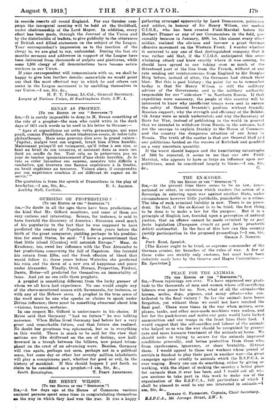GUESSING OR PROPHESYING?
[To THE EDITOR OP THE " SPEOTATOR."] ent,—No doubt in all the ages there have been predictions of the kind that Mr. Gifford mentions, and some of them are very curious and interesting. Seneca, for instance, is said to have foretold the discovery of America : Rousseau owed much of his popularity to the fact that he was supposed to have predicted the wining of Napoleon. Seven years before the birth of the great conqueror, yielding perhaps to his predilection for email States, he said "1 have a presentiment that that little island [Corsica] will astonish Europe." Mine. de Krudener, too, owed her influence with the Tsar Alexander to her predictions concerning the fall of Napoleon. She foretold his return from Elba, and the fresh effusion of blood that would follow it; three years before Waterloo she predicted his ruin and the dawn of a new era of happiness and peace under Alexander. Finally, Ovid, Horace, Propertius, Firdusi, Dante, Heine—all predicted for themselves an immortality of fame. And yet no one calls them prophets.
A prophet is something different from the lucky guesser of whom we all have had experience. No one would couple any of the above-mentioned names with Savonarola, for instance, or with any of the Hebrew seers. A prophet in the true sense of the word must be one who speaks or claims to speak under Divine influence; there must be something abnormal about him —visions, trances, ecstasies.
In one respect Mr. Gifford is unfortunate in his choice. If Heine said that Germany "had no future" he was talking nonsense. When Heine lived Germany had before her a very great and remarkable future, and that future she realized. No doubt her greatness was ephemeral, but so is everything in this world. There is much to be said for the view that nations are like driftwood on the sea of destiny, now halfdrowned in a trough between the billows, now poised triumphant on the crest of an advancing wave. Besides, Germany will rise again, perhaps not soon, perhaps not in a political sense, but some day or other her seventy million inhabitants will play a conspicuous part, whether for good or evil, in the history of mankind. If this should happen I put forth no claim to be considered as a prophet.—I am, Sir, &c., South Kensington. T. PERCY ARMSTRONG.


































 Previous page
Previous page